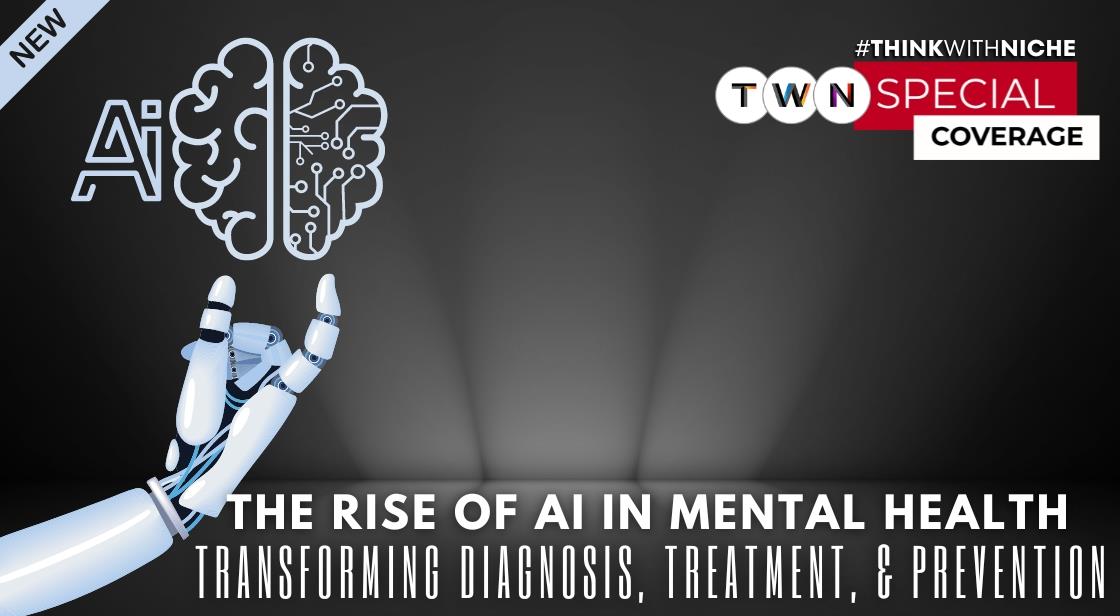The Rise of AI in Mental Health: Transforming Diagnosis, Treatment, and Prevention

Blog Post
The mental health landscape is experiencing a seismic shift driven by a powerful force: Artificial Intelligence (AI). No longer the stuff of science fiction, AI is rapidly reshaping diagnosis, treatment, and even prevention in this crucial domain.
This burgeoning revolution promises not just accessible interventions, but a proactive approach to safeguarding mental well-being.
This isn't mere hype; it's backed by compelling data. Recent studies indicate that nearly 1 in 5 adults worldwide experience mental illness each year, yet less than half receive the treatment they need.
This staggering gap highlights the dire need for innovative solutions. Enter AI, poised to fill this void and empower individuals to cultivate flourishing mental health.
Imagine a future where:
-
AI deciphers the hidden language of mental health – analyzing speech patterns, facial expressions, and even smartphone data to detect early signs of stress, anxiety, or depression, paving the way for timely intervention.
-
Chatbots become personalized allies – offering 24/7 emotional support, tailored coping strategies, and evidence-based CBT techniques, making help accessible even in areas with limited human therapists.
-
Wearable data and AI become proactive guardians – predicting potential mental health challenges based on sleep patterns, heart rate, and activity levels, empowering individuals to take preventive measures and build resilience.
This isn't a pipe dream; it's the cutting edge of reality.
But amidst this excitement, caution remains paramount. Data privacy, transparency in algorithms, and the irreplaceable value of human connection must be carefully considered.
AI serves as a powerful tool, but it cannot replace the warmth, empathy, and expertise of human therapists.
This blog delves into the exciting possibilities of AI in mental health, exploring its potential to revolutionize diagnosis, treatment, and even prevention.
We'll examine real-world examples, address ethical considerations, and emphasize the importance of human connection in this transformative journey.
"Join us as we explore the rise of AI in mental health – a revolution with the potential to pave the way for a future where mental well-being flourishes for all."
The Rise of AI in Mental Health: Transforming Diagnosis, Treatment, and Prevention
1. AI Revolutionizing Early Detection and Diagnosis in Mental Health
Beyond Therapy: AI Takes Mental Health Diagnostics and Intervention to the Next Level
The landscape of mental health is undergoing a transformative shift, propelled by the powerful tools of artificial intelligence (AI). Gone are the days of solely relying on subjective assessments and limited data. AI is pushing the boundaries of early detection, diagnosis, and intervention, paving the way for a future where personalized, data-driven approaches reign supreme.
From Shadows to Spotlight: Early Detection through AI
Traditionally, mental health challenges often lurk in the shadows, undetected and untreated until symptoms become debilitating. But AI-powered tools are shining a light on these hidden struggles. Natural Language Processing (NLP) analyzes vast amounts of text data, including social media posts, emails, and even voice recordings, to identify subtle markers of emotional distress, anxiety, or depression. This empowers individuals and healthcare professionals alike to intervene much earlier, preventing the escalation of mental health issues.
Beyond Labels: Precision Diagnosis with AI
Historically, mental health diagnoses have often been broad and imprecise, leading to inadequate or mismatched treatment plans. AI, however, offers a paradigm shift. Machine learning algorithms can analyze complex clinical data, including brain scans, genetic markers, and behavioral patterns, to provide detailed and nuanced diagnoses. This allows for personalized treatment plans tailored to the individual's unique needs and biological makeup, significantly improving treatment outcomes.
More Than Words: AI-Powered Tools for Intervention and Support
The therapeutic landscape is also rapidly evolving with the help of AI. Conversational AI and chatbot technologies are playing a crucial role in providing accessible and scalable mental health support. These virtual companions can offer personalized guidance, manage stress, and conduct cognitive behavioral therapy, empowering individuals to navigate their mental health journeys even when access to human therapists is limited.
A Glimpse into the Future: Examples of AI in Action
-
Mindstrong: This platform uses smartphone data, such as typing patterns and screen interactions, to detect early signs of mental health conditions like depression and anxiety.
-
Woebot: This AI-powered chatbot provides emotional support and early intervention for mental health concerns, offering a safe and confidential space for individuals to express their struggles.
-
SpringSense: This app uses AI to analyze speech patterns and facial expressions to provide real-time feedback on emotional regulation strategies, helping individuals manage stress and anxiety in the moment.
2. AI-Powered Therapies: Accessible Support for All
Democratizing Mental Wellness: AI Therapies Open Doors to Accessible Support for All
Imagine a world where accessing effective mental health support is as easy as using your phone, regardless of location, financial constraints, or stigma. This is the future promised by AI-powered therapies, and it's closer than you think. These innovative tools are revolutionizing the way we approach mental health care, bringing personalized, evidence-based interventions to the fingertips of everyone.
Breaking Down Barriers:
Traditionally, access to quality mental health care has been riddled with obstacles. Long waitlists, geographical limitations, and the high cost of traditional therapy often leave many struggling in silence. AI-powered therapies address these challenges head-on:
-
Accessibility: Chatbots and virtual assistants provide 24/7 support, eliminating geographical and scheduling hurdles. They offer a safe space for individuals to express their concerns and work on their mental well-being, even in areas with limited access to human therapists.
-
Affordability: Compared to traditional therapy, AI-powered tools are often significantly cheaper or even free, making them a viable option for those with limited financial resources.
-
Reduced Stigma: The anonymity and privacy offered by these digital companions can significantly reduce the stigma associated with seeking mental health help, encouraging individuals to prioritize their well-being without fear of judgment.
Beyond Words: Tailored Therapies for Diverse Needs:
AI is not a one-size-fits-all solution. These tools leverage machine learning and advanced algorithms to personalize interventions based on individual needs and preferences. By analyzing data like speech patterns, emotional responses, and activity levels, AI-powered therapies can:
-
Provide accurate assessments: Identify early signs of mental health concerns, leading to timely interventions and improved outcomes.
-
Offer guided therapies: Deliver personalized cognitive behavioral therapy (CBT), mindfulness exercises, and other evidence-based techniques tailored to individual needs and goals.
-
Track progress and adapt: Continuously monitor progress and adjust the therapy approach based on real-time data, ensuring optimal results.
Democratizing Wellness: Real-World Examples:
The promise of AI-powered therapies is no longer theoretical. Here are some pioneering examples in action:
-
Talkspace: This online platform connects individuals with licensed therapists via text, video, and audio messaging, making therapy accessible even in remote areas.
The Future of Mental Health Care:
While AI presents a transformative opportunity, it's important to remember that technology alone cannot be the sole answer. Human connection, empathy, and holistic approaches remain crucial. The future lies in integrating AI-powered tools with traditional therapist support, creating a comprehensive and accessible mental health ecosystem that caters to the unique needs of each individual.
3. Proactive Prevention: AI as a Guardian of Mental Well-being
Beyond Diagnosis: AI as a Guardian Angel, Proactively Safeguarding Your Mental Well-being
Mental health isn't just about treating illness; it's about proactive prevention, and that's where AI is poised to make a groundbreaking impact. Imagine a world where AI acts as your personal guardian angel, anticipating potential mental health challenges and guiding you towards optimal well-being before symptoms even arise. This isn't a futuristic fantasy; it's the burgeoning reality powered by cutting-edge AI advancements.
Shifting the Paradigm: From Reactive to Proactive:
Traditionally, mental health interventions have been reactive, focusing on diagnosis and treatment after symptoms manifest. But AI offers a paradigm shift, allowing us to move towards proactive prevention.
By analyzing vast amounts of data from wearable devices, smartphone usage, social media interactions, and even voice patterns, AI can identify subtle yet critical markers of stress, anxiety, or emotional dysregulation.
This early detection empowers individuals and healthcare professionals alike to intervene before issues escalate, preventing the onset of mental health challenges.
Personalized Roadmaps to Well-being:
Gone are the days of one-size-fits-all approaches to mental health. AI personalizes the journey to well-being by:
-
Tailoring interventions: Based on individual data and preferences, AI recommends personalized strategies like mindfulness exercises, relaxation techniques, or even adjustments to daily routines, proactively mitigating potential stressors.
-
Building resilience: AI-powered tools can gamify mental health practices, making them engaging and sustainable, ultimately building long-term resilience against future challenges.
-
Identifying triggers: By analyzing patterns in data, AI can pinpoint specific triggers that negatively impact an individual's mental well-being, allowing them to avoid these triggers and maintain emotional stability.
Examples of AI Guardians in Action:
-
Akili Interactive: This wearable device uses EEG technology to detect early signs of anxiety and depression, providing real-time feedback and personalized exercises to mitigate stress and prevent escalation.
-
Pear Therapeutics: This company's digital therapeutics platform combines cognitive behavioral therapy with smartphone monitoring to address conditions like PTSD and insomnia, offering proactive interventions and personalized support.
-
Rise Above Labs: This platform leverages AI to analyze users' speech patterns and provide personalized stress management tips and techniques, helping individuals maintain emotional well-being throughout their day.
Ethical Considerations and the Human Touch:
While AI's potential for proactive mental health protection is immense, ethical considerations remain paramount. Data privacy, transparency in algorithms, and the potential for over-reliance on technology must be carefully addressed. Ultimately, AI should be seen as a powerful tool to complement, not replace, the human touch. Experienced therapists and counselors are still crucial for providing personalized support, empathy, and guidance throughout the mental well-being journey.
A Future of Flourishing Minds:
By harnessing the power of AI for proactive prevention, we can envision a future where mental well-being becomes a priority, not an afterthought. Imagine a world where AI acts as a vigilant guardian, safeguarding our mental health just as diligently as it secures our physical health. This is not just a technological breakthrough; it's a transformative shift towards a society where everyone has the opportunity to flourish and thrive.
Also Read: Technology and UAE Help Advance the Medical Field
1. AI Decodes the Hidden Language of Mental Health: From Speech and Behavior to Early Intervention
Gone are the days when mental health concerns remained hidden in shadows. Today, AI is unveiling a new language, one woven from speech patterns, subtle gestures, and even smartphone data. By analyzing these clues, AI is revolutionizing early detection and intervention in mental health.
-
Listening Beyond Words: AI algorithms can detect subtle changes in speech patterns, like fluctuations in voice tone or hesitation, revealing early signs of stress, anxiety, or depression. This empowers healthcare professionals to intervene before symptoms escalate.
-
Body Language Speaks Volumes: AI can analyze facial expressions, body movements, and posture to identify emotional distress. Imagine apps using smartphone cameras to detect early signs of panic attacks based on changes in breathing patterns or facial expressions.
-
A Digital Footprint of Well-being: Wearable devices and smartphone data offer insights into sleep patterns, activity levels, and social interactions. AI can analyze these patterns to predict potential mental health challenges and trigger proactive interventions, like personalized mindfulness exercises or reminders to connect with loved ones.
2. Beyond Therapy: Personalized Coping Strategies Through AI-Powered Chatbots
No longer confined to sterile clinic rooms, therapy is finding a new form in AI-powered chatbots. These digital companions offer personalized coping strategies and emotional support, making help accessible even when human therapists are unavailable.
-
Always-Available Support: Chatbots offer 24/7 access to emotional support, providing a safe space to express anxieties, vent frustrations, and explore healthier coping mechanisms.
-
Tailored Strategies: AI analyzes user interactions and emotional responses to tailor coping strategies and mindfulness exercises, ensuring a personalized approach to mental well-being.
-
Breaking Down Stigma: The anonymous and confidential nature of chatbot interactions reduces the stigma associated with seeking mental health support, encouraging individuals to prioritize their well-being.
3. From Reactive to Proactive: Wearable Data and AI for Predicting and Preventing Mental Health Challenges
Imagine a future where your smartwatch doesn't just track steps, but predicts anxiety spikes and suggests preventive measures. This is the power of wearable data and AI in proactive mental health intervention.
-
Predicting the Storm: By analyzing sleep patterns, heart rate, and activity levels, AI can identify early warning signs of potential mental health challenges, allowing individuals to take proactive steps like practicing deep breathing exercises or contacting support systems.
-
Personalized Prevention: AI-powered apps can recommend customized coping strategies based on individual data and preferences, providing targeted interventions before symptoms even manifest.
-
Empowering Users: Wearable data and AI empower individuals to take control of their mental well-being, fostering a sense of agency and proactive involvement in their mental health journey.
4. Building Trust: Ensuring Robust Data Security and Privacy in Mental Health Apps
While AI presents transformative opportunities, data privacy and security remain paramount in mental health apps. Building trust necessitates:
-
Transparent Algorithms: Users deserve to understand how their data is used and how AI algorithms generate recommendations or predictions.
-
Robust Security Measures: Implementing strong data encryption and security protocols safeguards sensitive information from unauthorized access or breaches.
-
User Control: Allowing users to access, manage, and even delete their data empowers them to maintain control over their privacy and mental health journey.
5. The Human Touch: Cultivating Empathy and Patient Interaction Alongside AI Support
Technology serves as a powerful tool, but it cannot replace the human element in mental health care. Cultivating empathy and patient interaction alongside AI support remains crucial:
-
Human-Centered Design: AI-powered tools should be designed with empathy and user experience in mind, complementing, not replacing, human interaction.
-
Experienced Therapists: Integrating AI with qualified therapists ensures individuals receive personalized support and guidance tailored to their specific needs and emotional complexities.
-
Building Rapport and Trust: The therapeutic relationship remains central to positive mental health
In conclusion, AI's journey into the realm of mental health is a testament to our relentless pursuit of progress. It offers tools with the potential to revolutionize diagnosis, treatment, and prevention, paving the way for a future where mental health flourishes.
Yet, the road ahead demands thoughtful consideration of potential pitfalls. By safeguarding privacy, upholding the value of human connection, and harnessing AI's power responsibly, we can ensure that this technological revolution blossoms into a brighter future for mental well-being, one where hope and healing flourish for all.
You May Like
EDITOR’S CHOICE












